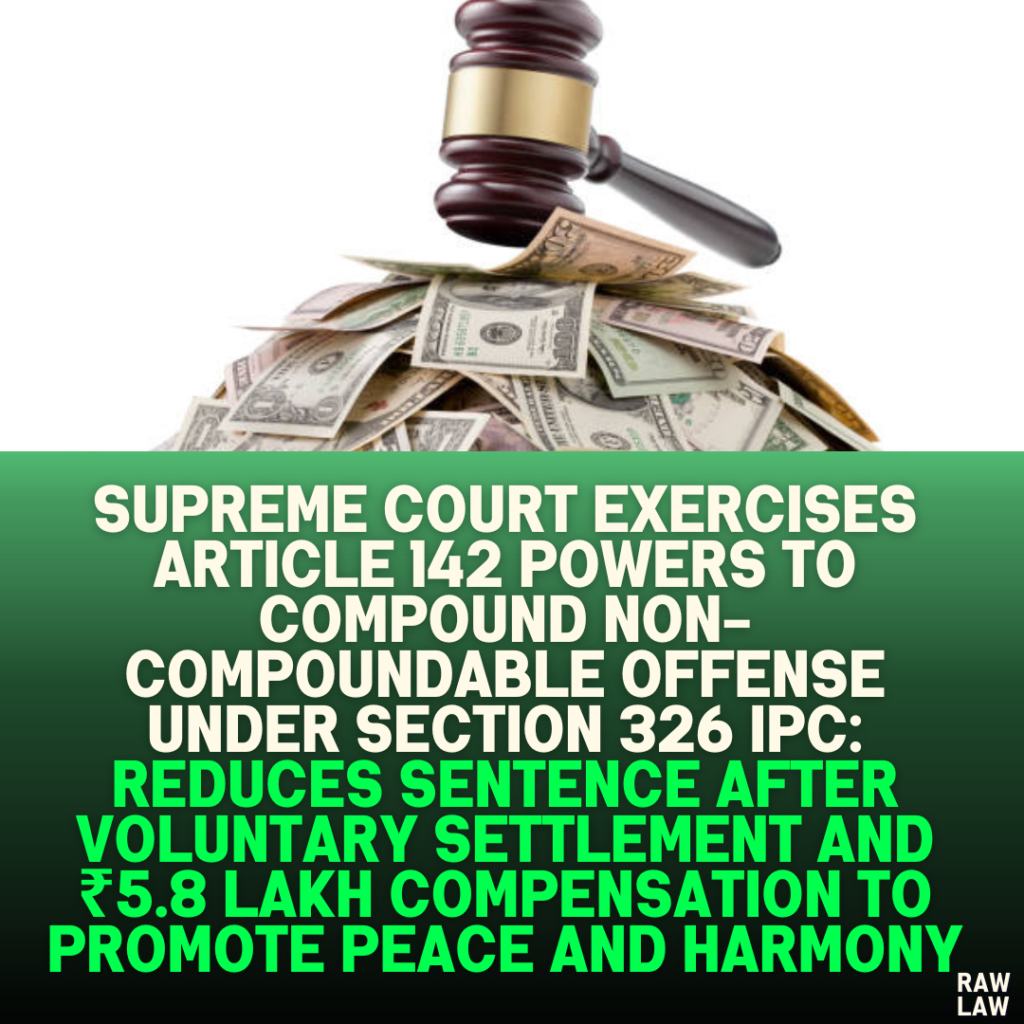Court’s Decision:
The Supreme Court granted the petitioner relief by allowing the compounding of the offense under Section 326 IPC. While compounding such an offense is typically not permissible under the Criminal Procedure Code (CrPC), the Court exercised its inherent powers under Article 142 of the Constitution. This allowed the Court to give effect to a compromise voluntarily reached between the parties after the dismissal of the petitioner’s earlier appeal.
The Court reduced the sentence to the period already served by the petitioner, finding the amicable settlement between the parties sufficient to justify such relief.
3. Facts:
- The Incident: The case arose from an unlawful assembly in which the petitioner (Accused No. 3) and others assaulted the complainant and his family, causing grievous injuries.
- Trial Court: The Trial Court convicted the petitioner and another co-accused under Section 326 IPC, sentencing them to two years of rigorous imprisonment (RI) and a fine of ₹2,000. Other accused were acquitted.
- High Court: On appeal, the High Court reduced the petitioner’s sentence to one year RI and enhanced the fine to ₹2,00,000. The co-accused was acquitted.
- Supreme Court: The petitioner challenged the High Court’s decision via a Special Leave Petition (SLP), which was dismissed on 19.01.2024, upholding the conviction.
- Settlement: After the dismissal of the SLP, the petitioner and the complainant reached an amicable settlement with the intervention of community elders, resolving all disputes. The settlement included ₹5,80,000 as compensation to the complainant.
4. Issues:
- Can a non-compoundable offense under Section 326 IPC be compounded through a voluntary settlement reached after the dismissal of a petition?
- Does the Court have the inherent power to allow compounding of non-compoundable offenses under exceptional circumstances?
5. Petitioner’s Arguments:
- Amicable Resolution: The petitioner highlighted that both families had resolved their disputes amicably, with elders and villagers mediating the settlement.
- Compensation: The petitioner agreed to pay ₹5,80,000 as compensation to the complainant, reflecting a genuine effort to ensure peace.
- Proximity and Relationships: Given the close physical proximity of their residences and familial ties, the petitioner emphasized the need to avoid further hostility and promote harmony.
- Exceptional Circumstances: The petitioner argued that the settlement covered not just the criminal case but also longstanding property disputes, justifying the exercise of the Court’s inherent powers.
6. Respondent’s Arguments:
- Support for Settlement: The complainant supported the petitioner’s plea for compounding, filing an Interlocutory Application affirming the compromise.
- Peace and Harmony: The complainant stressed that maintaining peaceful relations in their neighborhood was paramount, given their close proximity and shared social environment.
7. Analysis of the Law:
- Section 326 IPC: This provision deals with voluntarily causing grievous hurt by dangerous weapons or means. It is a serious offense categorized as non-compoundable under the CrPC, 1973.
- Inherent Powers of the Supreme Court: Article 142 of the Constitution empowers the Supreme Court to pass orders necessary to deliver complete justice. This provision has been previously invoked in exceptional cases to allow compounding of non-compoundable offenses where it serves justice and societal harmony.
8. Precedent Analysis:
The Court relied on established principles where:
- Voluntary Settlements: In prior cases, the Court has permitted compounding when disputes were amicably resolved, especially in cases involving familial or neighborhood disputes.
- Public Interest: The Court considered whether the settlement would serve the larger public interest, such as maintaining peace in closely-knit communities.
- Exceptional Circumstances: The Court evaluated whether the circumstances justified deviating from the strict prohibition on compounding non-compoundable offenses.
9. Court’s Reasoning:
- Voluntary and Comprehensive Settlement: The Court noted the voluntary nature of the compromise, which included resolving both criminal and civil disputes. The ₹5,80,000 compensation reflected the petitioner’s genuine efforts to end discord.
- Exceptional Circumstances: The close proximity and familial ties between the parties, coupled with the shared desire to maintain peace, constituted exceptional circumstances justifying relief.
- Inherent Powers: The Court exercised its inherent powers to ensure complete justice, as the settlement addressed the root cause of the dispute and promised long-term harmony.
10. Conclusion:
- The Court allowed the Miscellaneous Application, recalling its earlier order dismissing the SLP.
- It reduced the petitioner’s sentence to the period already served while confirming the conviction.
- All pending applications, including the Interlocutory Application for impleadment, were disposed of.
11. Implications:
- Judicial Discretion: The judgment reaffirms the judiciary’s discretion to allow compounding of non-compoundable offenses in exceptional cases.
- Focus on Reconciliation: It highlights the importance of fostering reconciliation and promoting societal harmony in closely connected communities.
- Broader Significance: The decision demonstrates how courts balance the strict application of law with the need for justice and peace in unique situations.
This case serves as a precedent for leveraging inherent judicial powers to resolve disputes in the interest of justice, even when statutory provisions might otherwise prohibit such relief.




Pingback: Bombay High Court Reiterates Strict Compliance with Procedural Mandates in Subdivision of Cooperative Societies: “Registrar Must Ensure Federal Society Consultation at the Correct Stage” - Raw Law